PRINCETON, NJ -- About one in four Republicans and Republican-leaning independents make Mitt Romney their top choice for the 2012 Republican presidential nomination, giving him a slight edge over Sarah Palin and Mike Huckabee. Former House Speaker Newt Gingrich is the choice of 14% of Republicans, with much smaller numbers choosing current Govs. Tim Pawlenty of Minnesota and Haley Barbour of Mississippi.
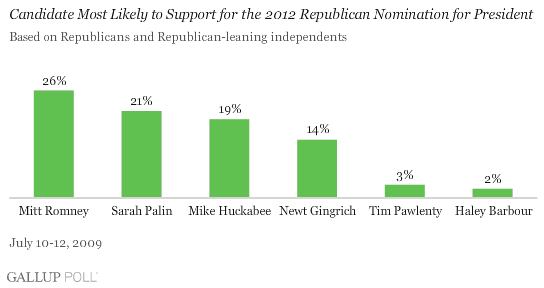
As of this moment, Romney, one of John McCain's chief rivals for the 2008 Republican presidential nomination, holds a slight but not statistically significant 26% to 21% advantage over Palin, who was McCain's vice presidential running mate.
Palin's strong showing suggests she remains a contender for GOP front-runner status even after her surprising decision to resign as governor of Alaska, which she announced July 3. Some have speculated that she made that decision with an eye toward running for president in 2012.
Favorable Ratings of Leading Contenders
While Palin trails Romney in the current candidate preference test, she leads both him and Huckabee in terms of their respective favorable ratings among Republicans. Currently, 72% of Republicans and Republican-leaning independents have a favorable opinion of Palin, compared with 56% for Romney and 59% for Huckabee. But her lead on this measure largely reflects the fact that she is better known than the two former governors, given the substantially lower "no opinion" figures for her. Republicans rate each candidate more positively than negatively by better than 3-to-1 ratios.
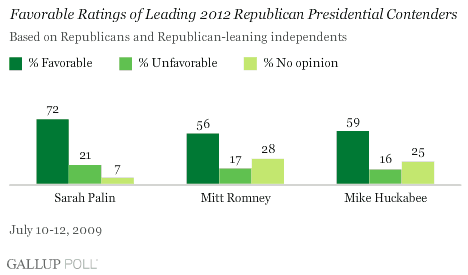
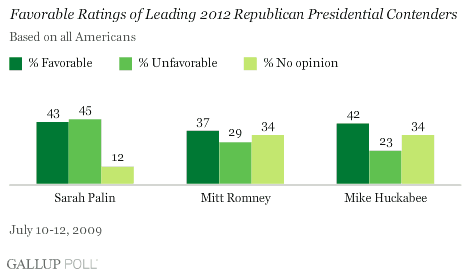
Still, her image has suffered somewhat among Republicans during this time. In November, 81% of Republicans viewed her favorably and 14% unfavorably, compared with the current ratings of 72% favorable and 21% unfavorable after her announced resignation.
Absence Makes the Heart Grow Fonder?
Though it is little over a year since the 2008 GOP primaries, Americans' opinions of Romney and Huckabee have changed significantly. Notably, each seems to have lost a significant share of the public familiarity he built up during the campaign. There has been a double-digit increase in the percentage of Americans who do not express either a positive or a negative opinion of both Romney and Huckabee.
However, the loss in familiarity may not be a bad thing, as the increase in "no opinion" has accompanied a corresponding drop in unfavorable ratings for each, with little change in their favorable ratings. Whereas Romney was viewed significantly more negatively than positively in February 2008, about the time he suspended his campaign, now on balance Americans view him more positively due to a 17-point drop in his unfavorable ratings.
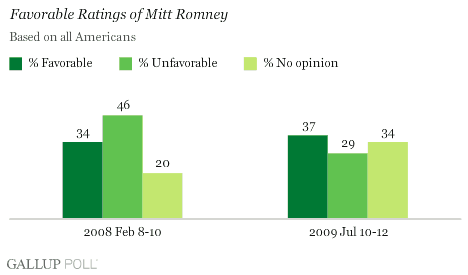
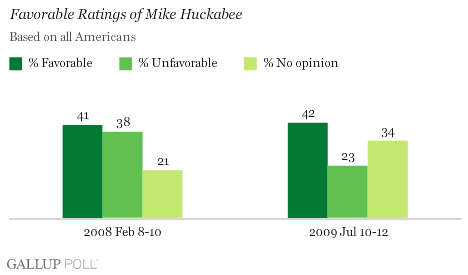
Implications
Presidential nomination preference polls conducted roughly three years before the party's nominating convention in general would not be expected to predict the eventual nominee. At this stage, these polls to a large degree reflect respondents' familiarity with the possible contenders. For example, Rudy Giuliani led most GOP preference polls in 2007, but performed dismally in the actual primaries and caucuses.
However, these early polls do give an indication of who the likely front-runners will be heading into the campaign, which should kick off after the 2010 November midterm elections. They also provide insights into the implications of Palin's highly-publicized decision to leave her job as governor of Alaska in the middle of her term. And, the Giuliani example notwithstanding, early front-runner status in Republican nomination contests is important, because historically, that person usually has won the nomination.
To the extent Palin, Romney, and Huckabee can capitalize on their higher name recognition than that of their possible challengers to raise money and build strong campaign organizations, they will be formidable contenders should they decide to pursue the 2012 Republican presidential nomination.
Survey Methods
Results are based on telephone interviews with 1,018 national adults, aged 18 and older, conducted July 10-12, 2009. For results based on the total sample of national adults, one can say with 95% confidence that the maximum margin of sampling error is ±3 percentage points.
For results based on the sample of 455 Republicans and Republican-leaning independents, the maximum margin of sampling error is ±5 percentage points.
Interviews are conducted with respondents on land-line telephones (for respondents with a land-line telephone) and cellular phones (for respondents who are cell-phone only).
In addition to sampling error, question wording and practical difficulties in conducting surveys can introduce error or bias into the findings of public opinion polls.
